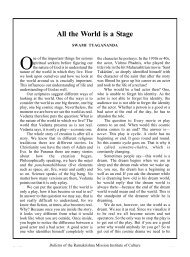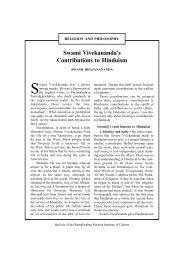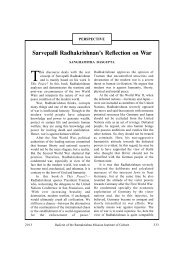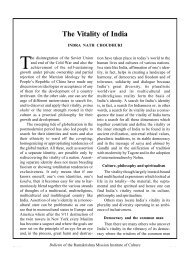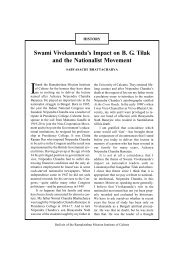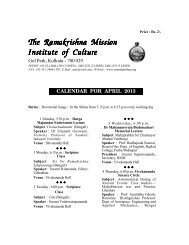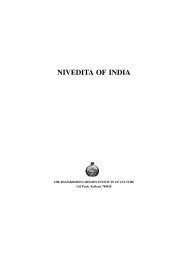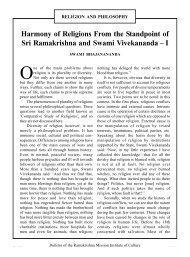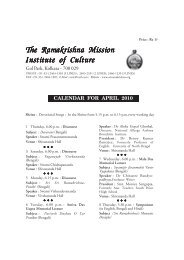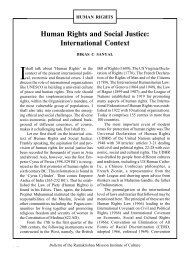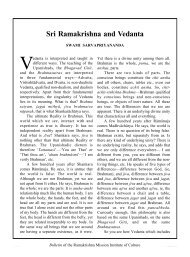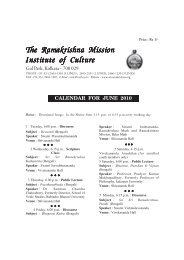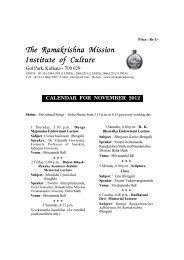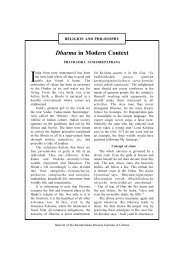Revisiting Educational Thoughts and Actions of Swami Vivekananda
Revisiting Educational Thoughts and Actions of Swami Vivekananda
Revisiting Educational Thoughts and Actions of Swami Vivekananda
Create successful ePaper yourself
Turn your PDF publications into a flip-book with our unique Google optimized e-Paper software.
BIKAS C. SANYAL<br />
EDUCATION<br />
<strong>Revisiting</strong> <strong>Educational</strong> <strong>Thoughts</strong> <strong>and</strong> <strong>Actions</strong><br />
<strong>of</strong> <strong>Swami</strong> Vivekan<strong>and</strong>a<br />
BIKAS C. SANYAL<br />
The topic that I have chosen had a<br />
beginning in the year 1992 when I<br />
called on <strong>Swami</strong> Lokeswaran<strong>and</strong>a,<br />
the then Secretary <strong>of</strong> the Ramakrishna<br />
Mission Institute <strong>of</strong> Culture. He asked me if<br />
I could explore the possibility <strong>of</strong> organizing<br />
the centenary <strong>of</strong> <strong>Swami</strong> Vivekan<strong>and</strong>a’s<br />
participation in the Parliament <strong>of</strong> Religions<br />
in 1993 at UNESCO.<br />
Although I had been working in an<br />
educational institution <strong>of</strong> UNESCO engaged<br />
in training <strong>and</strong> research for educational<br />
planning <strong>and</strong> management for the memberstates<br />
<strong>of</strong> the United Nations, little references<br />
at that time were made to <strong>Swami</strong><br />
Vivekan<strong>and</strong>a’s ideas on education. I had<br />
seen references to the ideas <strong>of</strong> Rabindranath<br />
Tagore, Sri Aurobindo, Krishnamurthy, but<br />
nowhere did I find any reference to the<br />
world leader in educational matters—<strong>Swami</strong><br />
Vivekan<strong>and</strong>a. But somehow I knew that<br />
there must have been some similarities<br />
between these two big organizations—<br />
UNESCO <strong>and</strong> the Ramakrishna Mission. So<br />
it made me look at the foundations <strong>of</strong> these<br />
two institutions, <strong>and</strong> I found many<br />
similarities.<br />
First, let me give you some idea <strong>of</strong> the<br />
objectives <strong>of</strong> the Ramakrishna Mission<br />
which was founded in May 1897. The<br />
Memor<strong>and</strong>um <strong>of</strong> Association says:<br />
The Objectives <strong>of</strong> the Association are:<br />
(a) To impart <strong>and</strong> promote the study <strong>of</strong> the<br />
Vedanta <strong>and</strong> its principles as propounded by<br />
Sri Ramakrishna <strong>and</strong> practically illustrated<br />
by his own life, <strong>and</strong> <strong>of</strong> comparative theology<br />
in its widest form.<br />
(b) To impart <strong>and</strong> promote the study <strong>of</strong> the<br />
arts, sciences, <strong>and</strong> industries.<br />
(c) To train teachers in all branches <strong>of</strong><br />
knowledge above-mentioned <strong>and</strong> enable<br />
them to reach the masses.<br />
(d) To carry on educational work among the<br />
masses.<br />
(e) To establish, maintain, carry on, <strong>and</strong><br />
assist schools, colleges, orphanages,<br />
workshops, laboratories, hospitals,<br />
dispensaries, houses for the infirm, the<br />
invalid <strong>and</strong> afflicted, famine relief works,<br />
<strong>and</strong> other educational <strong>and</strong> charitable works,<br />
<strong>and</strong> institutions <strong>of</strong> a like nature.<br />
(f) To print <strong>and</strong> publish <strong>and</strong> to sell or<br />
distribute gratuitously or otherwise,<br />
journals, periodicals, books or leaflets, that<br />
the Association may think desirable for the<br />
promotion <strong>of</strong> its objects.<br />
(g) To incorporate any institutions, societies,<br />
or associations having objects wholly or in<br />
part similar to any <strong>of</strong> those <strong>of</strong> the<br />
Association, <strong>and</strong> to co-operate with any<br />
person or persons in aid <strong>of</strong> such objects.<br />
I found that six <strong>of</strong> the seven objectives<br />
<strong>of</strong> the Ramakrishna Mission mentioned<br />
above deal with education, science <strong>and</strong><br />
culture. The UNESCO is dealing exactly<br />
with all these,—hence it is named United<br />
416 Bulletin <strong>of</strong> the Ramakrishna Mission Institute <strong>of</strong> Culture September
REVISITING EDUCATIONAL THOUGHTS AND ACTIONS OF<br />
SWAMI VIVEKANANDA<br />
Nations <strong>Educational</strong> Scientific <strong>and</strong> Cultural<br />
Organization. Now, let us have a look at the<br />
UNESCO’s mission. It says:<br />
1. The purpose <strong>of</strong> the organization is to<br />
contribute to peace <strong>and</strong> security by<br />
promoting collaboration among the nations<br />
through education, science <strong>and</strong> culture in<br />
order to further universal respect for justice,<br />
for the rule <strong>of</strong> law <strong>and</strong> for the human rights<br />
<strong>and</strong> fundamental freedoms which are<br />
affirmed for the people <strong>of</strong> the world, without<br />
distinction <strong>of</strong> race, sex, language or religion,<br />
by the Charter <strong>of</strong> the United Nations.<br />
2. To realize this purpose, the Organization<br />
will: (a) Collaborate in the work <strong>of</strong><br />
advancing the mutual knowledge <strong>and</strong><br />
underst<strong>and</strong>ing <strong>of</strong> peoples, through all means<br />
<strong>of</strong> mass communication <strong>and</strong> to that end<br />
recommend such international agreements as<br />
may be necessary to promote the free flow <strong>of</strong><br />
ideas by word <strong>and</strong> image;<br />
(b) Give fresh impulse to popular education<br />
<strong>and</strong> to the spread <strong>of</strong> culture:<br />
By collaborating with Members, at their<br />
request, in the development <strong>of</strong> educational<br />
activities;<br />
By instituting collaboration among the<br />
nations to advance the ideal <strong>of</strong> equality <strong>of</strong><br />
educational opportunity without regard to<br />
race, sex or any distinctions, economic or<br />
social;<br />
By suggesting educational methods best<br />
suited to prepare the children <strong>of</strong> the world for<br />
the responsibilities <strong>of</strong> freedom;<br />
(c) Maintain, increase <strong>and</strong> diffuse<br />
knowledge:<br />
By assuring the conservation <strong>and</strong> protection<br />
<strong>of</strong> the world’s inheritance <strong>of</strong> books, works <strong>of</strong><br />
art <strong>and</strong> monuments <strong>of</strong> history <strong>and</strong> science,<br />
<strong>and</strong> recommending to the nations concerned<br />
the necessary international conventions;<br />
By encouraging co-operation among the<br />
nations in all branches <strong>of</strong> intellectual<br />
activity, including the international<br />
exchange <strong>of</strong> persons active in the fields <strong>of</strong><br />
education, science <strong>and</strong> culture <strong>and</strong> the<br />
exchange <strong>of</strong> publications, objects <strong>of</strong> artistic<br />
<strong>and</strong> scientific interest <strong>and</strong> other materials <strong>of</strong><br />
information;<br />
By initiating methods <strong>of</strong> international co-operation<br />
calculated to give the people <strong>of</strong> all<br />
countries access to the printed <strong>and</strong> published<br />
materials produced by any <strong>of</strong> them.<br />
3. With a view to preserving the independence,<br />
integrity <strong>and</strong> fruitful diversity <strong>of</strong> the<br />
cultures <strong>and</strong> educational systems <strong>of</strong> the<br />
States Member <strong>of</strong> the Organization, the Organization<br />
is prohibited from intervening in<br />
matters which are essentially within their<br />
domestic jurisdiction.<br />
So, it was a pleasant surprise for me that<br />
<strong>Swami</strong>ji could be so precise in setting the<br />
ideals <strong>of</strong> education more than five decades<br />
earlier than the establishment <strong>of</strong> UNESCO. I<br />
also believe that an early appreciation <strong>of</strong><br />
<strong>Swami</strong>ji’s ideas on education would have<br />
helped UNESCO to articulate its own<br />
objectives in a much better way.<br />
Unfortunately, very few UNESCO people<br />
knew about <strong>Swami</strong>ji <strong>and</strong> his exemplary<br />
vision until 1993. The Director-General <strong>of</strong><br />
UNESCO, however, gave the inaugural<br />
speech at a seminar in commemoration <strong>of</strong><br />
the centenary <strong>of</strong> <strong>Swami</strong>ji’s historic addresses<br />
at the Parliament <strong>of</strong> Religions in Chicago. I<br />
had the privilege <strong>of</strong> coordinating the seminar<br />
in co-operation with the Indian Embassy, the<br />
Indian delegation <strong>of</strong> UNESCO, <strong>and</strong> the<br />
Centre Vedantique Ramakrishna—the<br />
branch <strong>of</strong> the Ramakrishna Mission in<br />
France. It was held at UNESCO on 8<br />
October 1993. The Director-General, having<br />
recognized the contributions <strong>of</strong><br />
Vivekan<strong>and</strong>a, pointed out a few things. First<br />
he said, <strong>Swami</strong> Vivekan<strong>and</strong>a’s commitment<br />
to universalism <strong>and</strong> tolerance is active<br />
identification with humanity as a whole.<br />
2012 Bulletin <strong>of</strong> the Ramakrishna Mission Institute <strong>of</strong> Culture<br />
417
BIKAS C. SANYAL<br />
Second, he showed remarkable concern for<br />
the poor <strong>and</strong> the destitute people. The<br />
Mission he established in India <strong>and</strong> which<br />
has now spread all over the world is working<br />
to reduce poverty <strong>and</strong> eliminate<br />
discrimination among the different segments<br />
<strong>of</strong> the society. There is no greater challenge<br />
we face today than this <strong>and</strong>, he added, that<br />
he believed that the United Nations has been<br />
working with all possible NGO partners to<br />
overcome these problems. ‘Maybe, soon we<br />
shall see the Ramakrishna Mission to be a<br />
respectable <strong>and</strong> respected NGO <strong>of</strong><br />
UNESCO.’ Thirdly, the Director-General<br />
pointed out that <strong>Swami</strong>ji’s preoccupation<br />
with human development <strong>and</strong> his vision <strong>of</strong><br />
education, science <strong>and</strong> culture are the<br />
essential instruments for such development.<br />
But his final recognition <strong>of</strong><br />
Vivekan<strong>and</strong>a’s ideas came from the<br />
following statement: ‘I am struck by the<br />
similarities <strong>of</strong> the constitutions <strong>of</strong> the<br />
Ramakrishna Mission established as early as<br />
1897 with that <strong>of</strong> UNESCO drawn up in<br />
1945. Both place the human being at the<br />
centre <strong>of</strong> their efforts in their development.<br />
Both place tolerance at the top <strong>of</strong> their<br />
agenda for building peace <strong>and</strong> democracy.<br />
Both recognize the variety <strong>of</strong> the human<br />
cultures <strong>and</strong> societies as an essential aspect<br />
<strong>of</strong> the common heritage.’<br />
With this background information let me<br />
dwell upon <strong>Swami</strong>ji’s ideas <strong>of</strong> real<br />
education. <strong>Swami</strong> Vivekan<strong>and</strong>a said: ‘If you<br />
have assimilated five ideas <strong>and</strong> made them<br />
your life <strong>and</strong> character, you have more<br />
education than any man who has got by<br />
heart a whole library.’ [C.W. III. 302] I shall<br />
modestly attempt to share five <strong>of</strong> his ideas<br />
which I have tried to assimilate.<br />
First, his definition <strong>of</strong> education <strong>and</strong> his<br />
concern about the need to strengthen<br />
spiritual <strong>and</strong> secular values in education;<br />
second, his appeal for spreading moral <strong>and</strong><br />
ethical education; third, his ideas <strong>of</strong> women<br />
education; fourth, his call for education <strong>of</strong><br />
the masses; <strong>and</strong> fifthly, his idea about the<br />
need for an interface between science <strong>and</strong><br />
religion in the present-day world.<br />
<strong>Swami</strong>ji lived in the 19th century. But<br />
you see how relevant his statements <strong>and</strong> his<br />
messages are even today! Frankly speaking,<br />
his ideas are even more necessary today to<br />
be practised <strong>and</strong> realized than they were<br />
during his time—not only by Indians but by<br />
the people <strong>of</strong> the whole world.<br />
<strong>Swami</strong>ji defined education as ‘. . .the<br />
manifestation <strong>of</strong> the perfection already in<br />
man.’ [C.W. IV. 358] What a man learns is<br />
really what he discovers by taking the cover<br />
<strong>of</strong>f his own soul which is the mine <strong>of</strong> infinite<br />
knowledge, he asserts. Indeed, the origin <strong>of</strong><br />
the idea lies in the philosophy <strong>of</strong> Vedanta<br />
which asserts that knowledge is inherent in<br />
human being like spark in a piece <strong>of</strong> flint.<br />
All that is needed is the strike <strong>of</strong> a<br />
suggestion to bring it out.<br />
After 1993 some activities started at<br />
UNESCO. In 2002, UNESCO awarded a<br />
prize. Then we started working on the ideas<br />
<strong>of</strong> Vivekan<strong>and</strong>a’s education in the journal <strong>of</strong><br />
UNESCO. I requested <strong>Swami</strong> Prabhan<strong>and</strong>aji<br />
Maharaj to write on Vivekan<strong>and</strong>a’s<br />
educational thoughts for that journal, <strong>and</strong> he<br />
did. I quote how he interpreted this<br />
particular sentence which we hear too <strong>of</strong>ten<br />
<strong>and</strong> also read about—‘Education is the<br />
manifestation <strong>of</strong> the perfection already in<br />
man.’ According to him, manifestation<br />
indicates a spontaneous growth provided<br />
that the impediments are removed. He<br />
explains the term ‘perfection’ as the goal <strong>of</strong><br />
actualizing the highest human potential.<br />
However, the goal varies from society to<br />
society <strong>and</strong>, in the context <strong>of</strong> the vast Indian<br />
civilization, perfection may be viewed from<br />
two levels.<br />
First is the metaphysical level where<br />
418 Bulletin <strong>of</strong> the Ramakrishna Mission Institute <strong>of</strong> Culture September
REVISITING EDUCATIONAL THOUGHTS AND ACTIONS OF<br />
SWAMI VIVEKANANDA<br />
perfection means the realization <strong>of</strong> the soul’s<br />
own ever-perfect nature. Second is the<br />
empirical level. There, according to<br />
Vivekan<strong>and</strong>a himself, perfection means<br />
achieving the stage where one st<strong>and</strong>s on<br />
one’s legs, well-equipped to win the<br />
struggles <strong>of</strong> life with a spirit <strong>of</strong> philanthropy<br />
<strong>and</strong> the courage <strong>of</strong> a lion.<br />
<strong>Swami</strong> Prabhan<strong>and</strong>a interpreted<br />
‘Perfection’ that is mentioned in <strong>Swami</strong>ji’s<br />
definition <strong>of</strong> education as the human beings’<br />
potential which has again three aspects. The<br />
first is capacity which means the acquisition<br />
<strong>of</strong> a specific characteristic or competence<br />
that makes learning possible. The second is<br />
propensity <strong>of</strong> doing something when the<br />
opportunity comes—implying the<br />
development <strong>of</strong> learning. And the third<br />
aspect is capability, the competence <strong>of</strong><br />
working towards an intended outcome with<br />
the strength <strong>of</strong> getting rid <strong>of</strong> obstacles to<br />
learning. It implies self-development or selfempowerment.<br />
Therefore, in the spiritual<br />
sense, education is the process <strong>of</strong><br />
discovering the capacity, propensity <strong>and</strong><br />
capability <strong>of</strong> a human being to realize his/<br />
her own soul’s ever-perfect nature.<br />
In the secular sense, education is the<br />
process <strong>of</strong> bringing out in a human being the<br />
capacity, the propensity <strong>and</strong> the capability <strong>of</strong><br />
self-development <strong>and</strong> self-empowerment in<br />
order to be self-reliant with a spirit <strong>of</strong><br />
philanthropy <strong>and</strong> courage. One may note<br />
here the continuity <strong>of</strong> secular <strong>and</strong> spiritual<br />
values in Vivekan<strong>and</strong>a’s definition <strong>of</strong><br />
education. We shall see how the secular<br />
values have also been emphasized by<br />
<strong>Swami</strong>ji, <strong>and</strong> how spirituality <strong>and</strong> secularism<br />
have been integrated in his thoughts, ideas<br />
<strong>and</strong> actions.<br />
In respect <strong>of</strong> the secular values,<br />
<strong>Swami</strong>ji continues: ‘Education is not the<br />
amount <strong>of</strong> information that is put into your<br />
brain <strong>and</strong> runs riot there, undigested, all<br />
your life. We must have life-building, manmaking,<br />
character-making assimilation <strong>of</strong><br />
ideas’. [C.W. III. 302] Then he goes on to<br />
say: ‘The training by which the current <strong>and</strong><br />
expression <strong>of</strong> will are brought under control<br />
<strong>and</strong> become fruitful is called education.’<br />
[C.W. IV. 490] So, according to him, the<br />
end <strong>of</strong> all education, all training should be<br />
man-making. Education should let human<br />
beings grow. What the country wants for<br />
that, he says, are ‘muscles <strong>of</strong> iron <strong>and</strong><br />
nerves <strong>of</strong> steel’. First <strong>of</strong> all, our young men<br />
<strong>and</strong> women must be strong. Religion will<br />
come afterwards. This is the special<br />
characteristic <strong>of</strong> Vivekan<strong>and</strong>a. Though a<br />
monk, he always stressed that the world is<br />
not to be ignored. Why? For our own<br />
benefit, as well as for the benefit <strong>of</strong> the<br />
world as a whole. He said: Be strong, my<br />
young friends. That is my advice to you.<br />
Indeed, the ultimate goal <strong>of</strong> the whole<br />
process <strong>of</strong> education is to unravel the truth<br />
<strong>of</strong> inherent perfection—perfection already<br />
existing in man. For that we have to<br />
combine knowledge with compassion,<br />
efficiency <strong>and</strong> moral excellence. This brings<br />
us to the next idea that I try to assimilate—<br />
the issue <strong>of</strong> moral <strong>and</strong> ethical education.<br />
While reviewing Politics, Theology <strong>and</strong><br />
History, a book by Raymond Plant, a<br />
philosopher, R. Harris, the Bishop <strong>of</strong><br />
Oxford, writes about Plant’s identification <strong>of</strong><br />
Christianity’s two weaknesses—the absence<br />
<strong>of</strong> a unified Christian view in trying to<br />
supply a religious view <strong>of</strong> society, <strong>and</strong> the<br />
use <strong>of</strong> terms such as ‘justice’, ‘common<br />
good’ <strong>and</strong> ‘community’ without providing<br />
any detailed underst<strong>and</strong>ing <strong>of</strong> what is meant<br />
by these. Under the circumstances, Plant<br />
questions the possibility <strong>of</strong> providing a<br />
moral basis for a liberal democratic society<br />
that can commend itself universally <strong>and</strong><br />
Christianity’s capacity to contribute to such<br />
a moral foundation.<br />
2012 Bulletin <strong>of</strong> the Ramakrishna Mission Institute <strong>of</strong> Culture<br />
419
BIKAS C. SANYAL<br />
Thus moral excellence that the Oxford<br />
pr<strong>of</strong>essor talks about is ignored in practice<br />
not only in Christian societies but in all<br />
others as well. Discrimination <strong>and</strong> hierarchy<br />
are still being practised as they were in the<br />
days <strong>of</strong> <strong>Swami</strong>ji. Then each religion,<br />
fanatically claimed superiority over others<br />
<strong>and</strong> did not hesitate to belittle the<br />
practitioners <strong>of</strong> other religions. <strong>Swami</strong>ji<br />
went out in that circumstances to broadcast<br />
what his Master, Sri Ramakrishna, taught<br />
him from his own experience <strong>and</strong><br />
demonstration that all religions lead to the<br />
same goal. Had Harris known about this<br />
experience he could be far more emphatic in<br />
contradicting Plant.<br />
Explaining the essence <strong>of</strong> religion,<br />
<strong>Swami</strong> Vivekan<strong>and</strong>a said, ‘Religion is not in<br />
books, nor in theories, nor in dogmas, nor in<br />
talking, not even in reasoning. It is being<br />
<strong>and</strong> becoming.’ [C.W., III. p. 253] It is<br />
realization. It is the innermost core <strong>of</strong><br />
education, manifesting the divinity already<br />
in man, as <strong>Swami</strong>ji said. That is why he<br />
proclaimed in the Parliament <strong>of</strong> Religions in<br />
Chicago on 11 September 1893:<br />
Sectarianism, bigotry, <strong>and</strong> the horrible<br />
descendant, fanaticism, have long possessed<br />
this beautiful earth. They have filled the<br />
earth with violence, drenched it <strong>of</strong>ten <strong>and</strong><br />
<strong>of</strong>ten with human blood, destroyed<br />
civilization <strong>and</strong> sent whole nations to<br />
despair. . . . But their time is come; <strong>and</strong> I<br />
fervently hope that the bell that tolled this<br />
morning in honour <strong>of</strong> this convention may<br />
be the death-knell <strong>of</strong> all fanaticism, <strong>of</strong> all<br />
persecutions with the sword or with the pen,<br />
<strong>and</strong> <strong>of</strong> all uncharitable feelings between<br />
persons wending their way to the same goal.<br />
Alas! the earth is as much, if not more,<br />
filled with violence <strong>and</strong> fanaticism today as<br />
it was then. What happened on 11<br />
September 2001 in New York <strong>and</strong> on 26<br />
November 2008 in Mumbai? Those were<br />
cruel demonstrations <strong>of</strong> the continued<br />
misuse <strong>and</strong> misinterpretation <strong>of</strong> religion.<br />
Vivekan<strong>and</strong>a therefore reminded us:<br />
‘The noblest words <strong>of</strong> peace that the<br />
world has ever heard have come from<br />
men on the religious plane, <strong>and</strong> the bitterest<br />
denunciation that the world has ever<br />
known has been uttered by religious men.’<br />
[C.W., II, 375]<br />
The world today is passing through this<br />
crisis. There is a great necessity therefore to<br />
stress the importance that the <strong>Swami</strong> gave to<br />
education for the cultivation <strong>of</strong> peace, a<br />
spirit <strong>of</strong> acceptance <strong>and</strong> inclusiveness.<br />
Contribution made by the<br />
Ramakrishna Mission<br />
The setting up <strong>of</strong> the Ramakrishna Math<br />
<strong>and</strong> Ramakrishna Mission was to<br />
demonstrate the universality <strong>of</strong> religion, not<br />
as a mode <strong>of</strong> belief or theory, but as a<br />
palpable reality through practice. This was<br />
one <strong>of</strong> the greatest contributions made by<br />
the Math <strong>and</strong> Mission to the human race<br />
in general, <strong>and</strong> Indians in particular. As<br />
on 2010, there are about 172 Mission<br />
centres, including 42 in 19 countries outside<br />
India, propagating this message. There are<br />
1506 educational institutions <strong>of</strong> various<br />
types with more than 400,000 students<br />
benefiting as much as possible from the type<br />
<strong>of</strong> education <strong>Swami</strong>ji envisaged. There are<br />
<strong>of</strong> course social, political, <strong>and</strong> ideological<br />
constraints. But all the same, the<br />
Ramakrishna Mission, institutions, I think,<br />
have kept its foundation strong.<br />
As we know, in almost all the<br />
educational institutions <strong>of</strong> the Mission,<br />
students have to study religion <strong>and</strong> culture as<br />
core subjects. Besides these students,<br />
millions <strong>of</strong> Indians <strong>and</strong> world citizens have<br />
been deriving benefit from the activities <strong>of</strong><br />
the Math <strong>and</strong> Mission. The 42 centres<br />
outside India have been spreading for<br />
420 Bulletin <strong>of</strong> the Ramakrishna Mission Institute <strong>of</strong> Culture September
REVISITING EDUCATIONAL THOUGHTS AND ACTIONS OF<br />
SWAMI VIVEKANANDA<br />
decades the message <strong>of</strong> Vivekan<strong>and</strong>a’s<br />
spiritual <strong>and</strong> secular values.<br />
These apart, Vivekan<strong>and</strong>a’s ideas on<br />
moral <strong>and</strong> ethical education have several<br />
other dimensions. First, although<br />
Vivekan<strong>and</strong>a, wanted men <strong>and</strong> women to<br />
grow intellectually, he was sceptical about<br />
the efficacy <strong>of</strong> dry intellectual training,<br />
which in most cases churn out irreligious<br />
persons. It is one <strong>of</strong> the evils <strong>of</strong> the Western<br />
civilization, he said, for mere intellectual<br />
education that does not take care <strong>of</strong> the heart<br />
only makes man ten times more selfish. We<br />
know about the recent financial crisis all<br />
over the world. The brains behind the whole<br />
scheme were all highly educated<br />
pr<strong>of</strong>essionals who cheated the world, <strong>and</strong><br />
who did not have the heart to feel the misery<br />
<strong>of</strong> the people they were cheating.<br />
We are also aware how the marketdominated<br />
society fuels the greed for<br />
unlimited material progress. There are then<br />
other problems such as deforestation, global<br />
warming, water <strong>and</strong> air pollution which are<br />
direct consequences <strong>of</strong> heedless industrial<br />
development. The Tsunami was a bitter<br />
lesson for us. The irregular climatic changes,<br />
droughts <strong>and</strong> recurring floods are all<br />
affecting our day-to-day lives severely <strong>and</strong><br />
that is because <strong>of</strong> uncaring industrialization.<br />
The development <strong>of</strong> biotechnology<br />
<strong>and</strong> benefits, bioinformatics have brought<br />
along with some problems <strong>of</strong> gene cloning,<br />
surrogate motherhood <strong>and</strong> invasion<br />
on privacy. The impact <strong>of</strong> ethics can<br />
be measured in high technology areas<br />
such as biology, medicine, as well as<br />
computer science. The phenomenon <strong>of</strong><br />
computerization is now affecting even<br />
our private life. There are good effects<br />
<strong>of</strong> all these but unregulated use <strong>of</strong> the<br />
devices <strong>of</strong> modern science <strong>and</strong> technology<br />
can wreak havoc in our life. If we do not<br />
care to connect basic ethics with<br />
technological progress we are bound to<br />
usher in an era <strong>of</strong> barbarism with a human<br />
face <strong>and</strong> destroy the earth.<br />
We are now shuddering with<br />
apprehension to think what will happen if<br />
nuclear bombs go in the h<strong>and</strong>s <strong>of</strong> the<br />
terrorists. Now, how do we face the<br />
situation? How will we give ethical<br />
education to the terrorists? This is a big<br />
challenge now—because the terrorists have<br />
also been created by education. Like<br />
religion, there has been gross misuse <strong>of</strong><br />
education when the Talibans are trained to<br />
terrorize people. In some parts <strong>of</strong> the world<br />
women are trained to become suicide<br />
bombers. What is the solution then? Should<br />
we hate education? Certainly not. We have<br />
to transform this ‘hate education’ attitude to<br />
‘love education’ outlook. Is it impossible? I<br />
do not think so because education has<br />
tremendous capacity to transform the human<br />
mind. If it can be done in the negative way,<br />
we can also do it in a positive way. But to do<br />
that, we must have the political will,<br />
commitment, <strong>and</strong> an institutional framework<br />
which Vivekan<strong>and</strong>a’s ideas could provide.<br />
He said, ‘In a conflict between the heart <strong>and</strong><br />
the brain, follow the heart.’<br />
Dwelling on the aspect <strong>of</strong> ethical<br />
education, he said that religions <strong>of</strong> the world<br />
are not contradictory or antagonistic, they<br />
are but various faces <strong>of</strong> one eternal religion.<br />
‘Our watchword, then, will be acceptance,<br />
<strong>and</strong> not exclusion. Not only toleration, for<br />
so-called toleration is <strong>of</strong>ten blasphemy, <strong>and</strong> I<br />
do not believe in it. . . . I accept all religions<br />
that were in the past, <strong>and</strong> worship with them<br />
all; I worship God with every one <strong>of</strong> them, in<br />
whatever form they worship Him. . . . Not<br />
only shall I do all these, but I shall keep my<br />
heart open for all that may come in the<br />
future.’ [C.W., II. pp. 373-74]<br />
<strong>Swami</strong>ji delineates the third aspect <strong>of</strong><br />
moral <strong>and</strong> ethical education with the<br />
2012 Bulletin <strong>of</strong> the Ramakrishna Mission Institute <strong>of</strong> Culture<br />
421
BIKAS C. SANYAL<br />
following words: ‘Help <strong>and</strong> not Fight’,<br />
‘Assimilation <strong>and</strong> not Destruction’,<br />
‘Harmony <strong>and</strong> Peace <strong>and</strong> not Dissension’.<br />
Again, ‘each must assimilate the spirit <strong>of</strong> the<br />
others <strong>and</strong> yet preserve his individuality <strong>and</strong><br />
grow according to his own law <strong>of</strong> growth.’<br />
[Ibid.] There we find the similarity between<br />
<strong>Swami</strong>ji’s ideas <strong>and</strong> UNESCO’s<br />
apprehension <strong>of</strong> prohibiting international<br />
interference into domestic affairs <strong>of</strong> a<br />
particular country.<br />
In his address at the inauguration <strong>of</strong><br />
the celebrations <strong>of</strong> <strong>Swami</strong>ji’s 150th birth<br />
anniversary on 12th January 2011, the Prime<br />
Minister <strong>of</strong> India, Dr Manmohan Singh,<br />
announced that his government was<br />
approving a grant <strong>of</strong> Rs 100 crores for<br />
a ‘value education’ project <strong>of</strong> the<br />
Ramakrishna Mission. He sincerely<br />
hoped that the project will help to inculcate<br />
in Indian children a moral compass <strong>and</strong> a<br />
value system that would provide a bulwark<br />
against a tide <strong>of</strong> commercialism that is<br />
sweeping our societies.<br />
Education <strong>of</strong> women<br />
This is one <strong>of</strong> the slogans <strong>of</strong> UNESCO<br />
on education for the 21st century. This leads<br />
us to the next idea <strong>of</strong> Vivekan<strong>and</strong>a—<br />
education <strong>of</strong> women. Women in India<br />
were far behind men in the field <strong>of</strong> education<br />
when <strong>Swami</strong>ji lived. Now the situation<br />
has somewhat improved but much remains<br />
to be done.<br />
Observing the state <strong>of</strong> women’s<br />
education in India, <strong>Swami</strong>ji lamented that he<br />
could not underst<strong>and</strong> why so much<br />
difference was made between men <strong>and</strong><br />
women, especially when Vedanta declared<br />
that one <strong>and</strong> the same Self was present in all<br />
beings. He quoted Manu to assert that<br />
daughters should be supported <strong>and</strong> educated<br />
with as much care <strong>and</strong> attention as the sons.<br />
This discrimination is made in every part <strong>of</strong><br />
our society even now. It is not only in India.<br />
This malady is present all over the world.<br />
You know that French <strong>and</strong> Swiss women got<br />
their voting rights not long ago. However,<br />
the fact is that all nations have attained<br />
greatness by paying proper respect to<br />
women. <strong>Swami</strong>ji therefore dem<strong>and</strong>ed<br />
forcefully that women must be put in a<br />
position so that they could solve their<br />
problems in their own way. Why not? Our<br />
Indian women are as capable <strong>of</strong> doing it as<br />
any other women in the world. These were<br />
<strong>Swami</strong>ji’s bold words uttered in the 19th<br />
century. Look at the life <strong>of</strong> Sri Sarada Devi,<br />
the Holy Mother—how powerful she had<br />
been spiritually! <strong>Swami</strong>ji therefore urged his<br />
followers to spread female education the<br />
absence <strong>of</strong> which caused to a great extent<br />
India’s degeneration. He pointed out<br />
unerringly that it was only in the homes <strong>of</strong><br />
educated <strong>and</strong> pious mothers that great men<br />
<strong>and</strong> women were born.<br />
I see quite a lot <strong>of</strong> hints in the statements<br />
<strong>of</strong> <strong>Swami</strong>ji. The UNESCO in one <strong>of</strong><br />
its slogans therefore says that if you educate<br />
a man, you educate one person. But<br />
when you educate women, you educate the<br />
whole family.<br />
Vivekan<strong>and</strong>a’s thinking on women’s<br />
education is more significant today when, in<br />
the name <strong>of</strong> religion, the women in some<br />
countries like Pakistan <strong>and</strong> Afghanistan are<br />
deprived not only <strong>of</strong> education but also <strong>of</strong><br />
health care <strong>and</strong> other basic human rights.<br />
In a letter written to his disciple,<br />
Alasinga, <strong>Swami</strong>ji laments: ‘And, oh, how<br />
my heart ached to think <strong>of</strong> what we think <strong>of</strong><br />
the poor, the low in India. They have no<br />
chance, no escape, no way to climb up.’<br />
Again, he tells an interviewer: ‘No amount<br />
<strong>of</strong> politics would be <strong>of</strong> any avail until the<br />
masses in India are once more well<br />
educated, well fed, <strong>and</strong> well cared for.’<br />
While the educationists today are trying<br />
422 Bulletin <strong>of</strong> the Ramakrishna Mission Institute <strong>of</strong> Culture September
REVISITING EDUCATIONAL THOUGHTS AND ACTIONS OF<br />
SWAMI VIVEKANANDA<br />
to demonstrate the correlation between the<br />
development <strong>of</strong> economy <strong>and</strong> education,<br />
<strong>Swami</strong>ji perceived it more than hundred<br />
years ago. He said, ‘I see it before my eyes,<br />
a nation is advanced in proportion as<br />
education <strong>and</strong> intelligence spread among the<br />
masses. The chief cause <strong>of</strong> India’s ruin has<br />
been the monopolizing <strong>of</strong> the whole<br />
education <strong>and</strong> intelligence <strong>of</strong> the l<strong>and</strong> by<br />
dint <strong>of</strong> pride <strong>and</strong> royal authority, among a<br />
h<strong>and</strong>ful <strong>of</strong> men. If we are to rise again, we<br />
shall have to do it in the same way, ie by<br />
spreading education among the masses.’<br />
[C.W., IV, p. 482] He also prescribed the<br />
means <strong>of</strong> achieving this goal, step by step.<br />
First he gives a pedagogical suggestion.<br />
He says: Give them ideas. That is the only<br />
help they require. Then the rest must follow.<br />
Second, he suggested that the medium <strong>of</strong><br />
instruction should be the mother tongue. The<br />
ideas must be taught in the language <strong>of</strong> the<br />
people. Third, he prescribed a cult <strong>of</strong><br />
learning among them to sustain the<br />
education they received. Fourth, he<br />
emphasized the need for imparting training<br />
in life skills, trade, commerce <strong>and</strong><br />
agriculture. Fifth, he said that mere<br />
provision <strong>of</strong> education was not enough. To<br />
begin with, he wanted that the selfsacrificing<br />
monks should go to the villages<br />
<strong>and</strong> teach them the secular subjects as well<br />
as religion <strong>and</strong> thus spread education from<br />
door to door. ‘Why should not education go<br />
from door to door, say I . . . . If a<br />
ploughman’s boy cannot come to education,<br />
why not meet him at the plough, . . .just<br />
wherever he is?’ said <strong>Swami</strong>ji. [C.W.,<br />
VIII, pp. 88-9]<br />
Attempts have been made by the monks<br />
<strong>of</strong> the Math <strong>and</strong> Mission to fulfil some <strong>of</strong> his<br />
expectations through various programmes<br />
over the century. And some more<br />
new programmes are being launched on<br />
the occasion <strong>of</strong> the 150th birth anniversary<br />
<strong>of</strong> <strong>Swami</strong>ji.<br />
I conclude with the last idea <strong>of</strong> <strong>Swami</strong><br />
Vivekan<strong>and</strong>a. It relates to <strong>Swami</strong>ji’s thought<br />
about the interaction between science <strong>and</strong><br />
religion. <strong>Swami</strong>ji’s spiritual contributions<br />
are well known. But very little is known<br />
about his scientific philosophy. He inspired<br />
Jamshedji Tata to establish a research<br />
institute for the development <strong>of</strong> science in<br />
India. Jamshedji later invited <strong>Swami</strong>ji to<br />
steward the institute. But <strong>Swami</strong>ji had then<br />
passed away.<br />
<strong>Swami</strong>ji was well aware that in the new<br />
age science <strong>and</strong> religion would meet <strong>and</strong><br />
shake h<strong>and</strong>s. Poetry <strong>and</strong> philosophy will<br />
become friends <strong>and</strong> that will be the religion<br />
<strong>of</strong> the future.<br />
A few days before <strong>Swami</strong>ji left his<br />
mortal body, he envisioned a university at<br />
Belur Math. He confided to Miss MacLeod<br />
that the spiritual power <strong>of</strong> Belur Math will<br />
last 1500 years <strong>and</strong> someday it will be a<br />
great university. ‘Do not think I am<br />
imagining it; I see it,’ he added.<br />
Today that university is a reality.<br />
Science <strong>and</strong> spirituality are on their way to<br />
be integrated. Indeed, to realize the vision <strong>of</strong><br />
<strong>Swami</strong>ji, the authorities are building the<br />
school <strong>of</strong> mathematical sciences <strong>and</strong> the<br />
school <strong>of</strong> Indian heritage side by side to<br />
facilitate that integration. A monastic<br />
member <strong>of</strong> the Order has recently received<br />
the Bhatnagar Award, which is given to an<br />
eminent scientist. The process <strong>of</strong> integration<br />
has started. And it shows that spirituality<br />
does not contradict scientific thoughts. •<br />
* This article is based on the transcript <strong>of</strong> a lecture Dr Bikas C. Sanyal delivered at the Institute on<br />
11 January 2012. Dr Sanyal is Honorary Director, Maison Del’Inde, Paris <strong>and</strong> Vice Chairman<br />
UNESCO, International Institute for Capacity Building in Africa.<br />
2012 Bulletin <strong>of</strong> the Ramakrishna Mission Institute <strong>of</strong> Culture<br />
423



